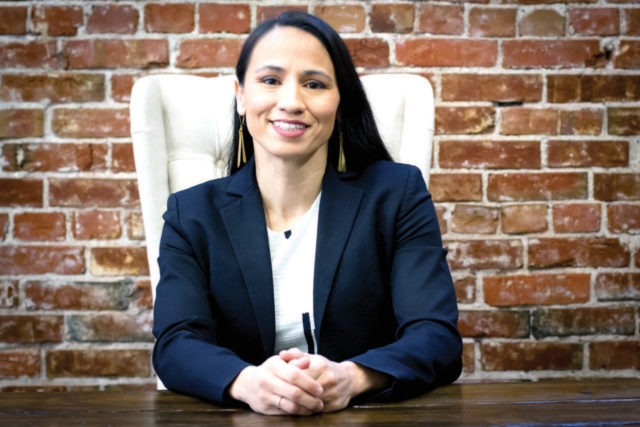
The number of LGBTQ-identified candidates running for office at the federal and state levels is higher this election cycle than ever before. In the September primaries, a record number of openly queer candidates won major party nominations. Now, as we prepare for Election Day next week, let’s check the status of LGBTQ nominees who are running for U.S. Senate, House, and state governorships across the country.
Arizona: In the Grand Canyon State, two women are battling to win the U.S. Senate seat to be vacated by Republican Jeff Flake: Democrat Kyrsten Sinema and Republican Martha McSally. Sinema identifies as bisexual. It’s an incredibly tight race, a squeaker, with some polls showing McSally ahead by a razor-thin margin. However, the Real Clear Politics average places Sinema ahead of McSally by less than one percentage point. This is one of the closest (and most closely watched) races in the country.
California: Katie Hill, who is openly bisexual, is the Democratic nominee for California’s 25th Congressional District. She’s running against GOP incumbent Steve Knight. The race is a total toss-up, with various polls showing either candidate leading by a small number of points. The latest New York Times/Siena poll shows Knight up by four. Still, it could go either way.
Colorado: Jared Polis, the Democratic nominee for governor, was the first openly gay parent elected to Congress in 2011. Now he’s running against Republican nominee Walker Stapleton. A Magellan Strategies voter opinion poll released yesterday shows Polis ahead of Stapleton by five points.
Kansas: Sharice Davids, an out lesbian, is the Democratic nominee for Kansas’s 3rd Congressional District in the U.S. House. She’s running strongly against GOP incumbent Kevin Yoder, and if she wins the seat, Davids will become Kansas’s first openly LGBTQ and first Native American in Congress. So far, polls favor Davids. A recent Emerson poll shows her up by 12 points.
Florida: Lauren Baer, a married lesbian, is hoping to win Florida’s 18th Congressional District seat. Her opponent is GOP incumbent U.S. Rep. Brian Mast. A poll released two months ago by Public Policy Polling (PPP) showed Baer running strong at 43 percentage points (with Mast leading with 46). But the current analysis from FiveThirtyEight predicts that Mast, a disabled veteran, will retain the office.
Minnesota: Angie Craig, who identifies as a lesbian, is the Democratic nominee for Minnesota’s 2nd Congressional District seat. Her opponent is the GOP incumbent U.S. Rep. Jason Lewis. The NYT Upshot/Siena College poll released in early October showed Craig with a nice lead (51 percent of the vote versus 39 for Lewis), but other polling data shows Lewis leading by as many as 12 points. It’s usually hard to unseat an incumbent, so it’s safe to say that Craig will have to continue to fight hard in that state.
New Hampshire: Chris Pappas, the Democratic nominee for New Hampshire’s 1st Congressional District, could become the state’s first openly gay member of Congress. He’s running against Republican Eddie Edwards for the seat. Recent polling shows Pappas consistently five-plus points ahead, but the race is getting tighter.
Ohio: Democrat Rick Neal, a gay man, is challenging Republican incumbent Rep. Steve Stivers for Ohio’s 15th Congressional District seat. Neal is one of 10 openly LGBTQ candidates running this year for either state or federal office in the Buckeye State. Unfortunately, Stivers is almost assured of re-election. Opinion poll analysis from FiveThirtyEight gives Neal only a one in 50 chance of winning.
Oregon: Democratic incumbent governor Kate Brown made history in 2014 by becoming the first openly bisexual person and the first openly LGBTQ person elected as a state governor in the U.S. She hopes to retain her office for another term by beating Republican challenger Knute Buehler. Recent polls show Brown with only a slim lead of three to five points.
Texas: Lupe Valdez is the first openly lesbian gubernatorial nominee of any major party. If elected, Valdez would also become the first openly LGBTQ person of color to serve as governor and the first Latinx governor of Texas. But she’s in a very tough race. Recent polls show her opponent, Republican incumbent Greg Abbott, heavily favored with a lead as high as 26 points. Meanwhile, an Iraq War veteran and intelligence officer, Gina Ortiz Jones–who identifies as a lesbian and has been out since her teens–is running for the U.S. House in Texas’s 23rd Congressional District. Her opponent is GOP incumbent Will Hurd. The latest polls show Hurd with a comfortable lead of eight to 15 points.
Wisconsin: Tammy Baldwin, the only out lesbian currently serving in the U.S. Senate, is up for re-election this year. Challenging her for the seat is Republican Leah Vukmir, a conservative “military mom” who has held statewide office. All available polling data shows Baldwin leading, anywhere from two to 17 points. While nothing in politics is guaranteed, Baldwin is expected to win re-election.
Vermont: Christine Hallquist, the nation’s first openly transgender major party nominee for governor, faces an uphill battle against Republican incumbent Phil Scott. A poll released by Vermont Public Radio on October 22 shows Scott up by 14 points.

What Do You Think?